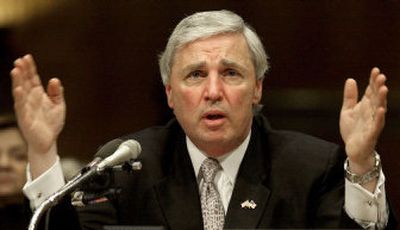Murray, Clinton demand decision on Plan B pill

WASHINGTON – President Bush on Wednesday nominated acting Commissioner Andrew von Eschenbach to permanently head the troubled Food and Drug Administration, but a controversy involving science and sexual mores could stall his confirmation by the Senate indefinitely.
Democratic Sens. Hillary Clinton of New York and Patty Murray of Washington announced Wednesday that they would block a floor vote on the nomination until the FDA makes a firm decision on the controversy – whether or not to allow Plan B, the so-called “morning after” birth control pill, to be sold without a prescription.
The same issue delayed confirmation of von Eschenbach’s predecessor, Lester M. Crawford, and is believed to have contributed to Crawford’s precipitous resignation last fall.
The agency’s scientific staff has long concluded that the contraceptive is safe and effective for over-the-counter use by women of all ages, according to internal memos recently released by Rep. Henry Waxman, D-Calif. But senior FDA officials have repeatedly delayed a final decision.
That has prompted some in the medical community, as well as Democrats such as Clinton and Murray, to charge that the agency compromised its scientific judgment under pressure from social conservatives influential in the Bush administration.
“This nomination will not move forward until there is a yes or no decision on Plan B,” Murray said.
Von Eschenbach, 64, director of the National Cancer Institute and a renowned prostate cancer surgeon from Texas, has headed the FDA since fall, when Crawford unexpectedly quit two months after his confirmation.
If von Eschenbach is confirmed, he is expected to focus on streamlining the process for approving new medications aimed at hard-to-cure diseases, such as several types of cancer. The agency must also establish a framework for regulating emerging fields such as genetic medicine. At the same time, the FDA is struggling to repair its image as a safety watchdog.
Von Eschenbach’s nomination had been expected for several weeks.
The administration has given no indication that it intends to resolve the Plan B controversy.
Senior Republicans warned the White House that the nomination would run into trouble without a decision on Plan B. Sen. Michael Enzi of Wyoming “strongly encouraged the administration to resolve the issue before moving forward to nominate,” said his spokesman, Craig Orfield. Enzi heads the Health, Education, Labor and Pensions Committee, which oversees the FDA.
Plan B has been available by prescription since 1999, but a decision on over-the-counter sales has been stalled. The contraceptive contains a higher dose of a hormone that also is in regular birth-control pills; it is most effective in preventing pregnancy when taken in the first 24 hours after unprotected sex.
The previous commissioner, Crawford, had promised to Enzi and other senior senators a firm decision on Plan B. That enabled the senators to persuade Clinton and Murray to allow a floor vote on Crawford’s nomination. Under Senate procedures, individual senators have the power to block such nominations as a matter of personal privilege.
But last summer, Crawford balked at reaching a decision. The FDA “double-crossed” the public, Murray said.